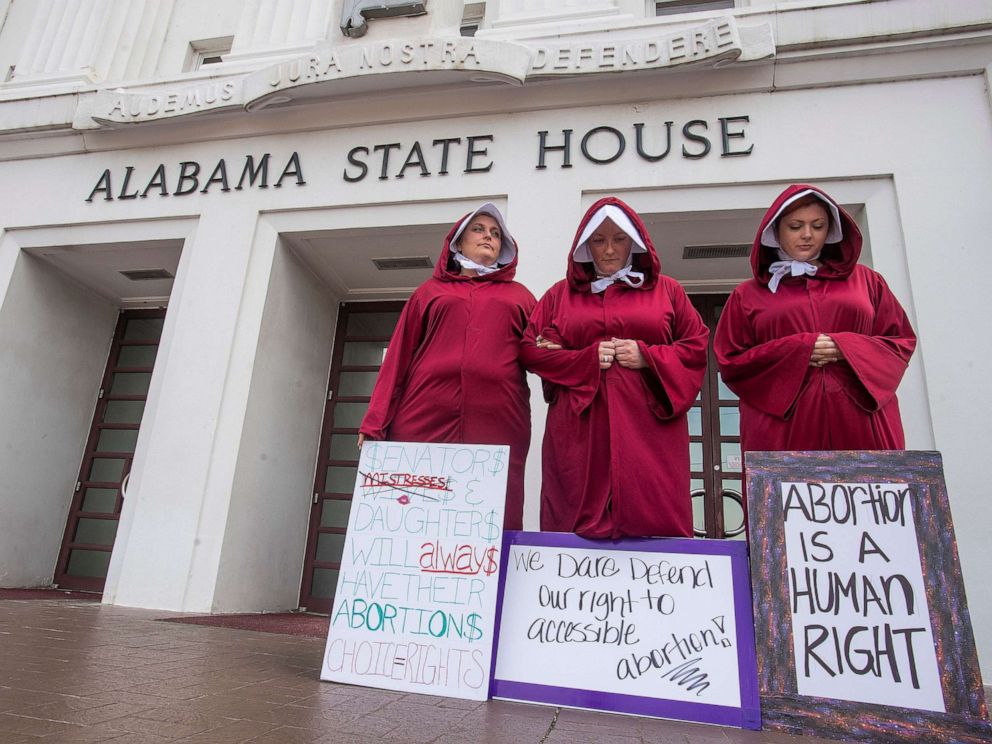Abortion advocates react to Alabama ban, increasingly hostile atmosphere
Alabama passed the strictest abortion law in the country.
The Alabama state Senate passed the most restrictive abortion bill in the nation, sending it to the governor's desk and setting off a wave of panic among abortion rights supporters.
The bill would make it a crime to provide an abortion at any gestational stage of pregnancy without exemptions for rape or incest.
Alabama Rep. Terri Collins, the Republican who sponsored the bill, told ABC News earlier this month she hopes it gets challenged should it be signed into law, so it could eventually make it to the Supreme Court to challenge the right to abortion nationwide.
The panic from many abortion rights supporters stems from concern that the Alabama bill could mean the end of the landmark Roe v. Wade decision that made abortion a nationally protected constitutional right.
But to legal experts at the Center for Reproductive Rights and the ACLU, the Alabama bill bringing on the overturning of Roe doesn't seem like much of a distinct possibility, at least for the near future.
"We are very confident that the courts are going to block this law from ever taking effect," Alexa Kolbi-Molinas, senior staff attorney at the ACLU's Reproductive Freedom Project, told ABC News.
Should Alabama Gov. Kay Ivey, a Republican, sign the bill into law, the ACLU plans to sue, Kolbi-Molinas said.
"That litigation could end up at the Supreme Court,” Elisabeth Smith, chief counsel of state policy and advocacy for the Center for Reproductive Rights, told ABC News. “But, what we know is that for four and a half decades with different justices on the court, the Supreme Court has always confirmed and reconfirmed that women have the right to abortion,"
Without a doubt, women are terrified and watching really closely.
In three cases dealing with abortion that have come to the Supreme Court facing three different combinations of justices, the court has "consistently confirmed that women have the right to have an abortion prior to viability,” according to Smith.
This includes Roe v. Wade in 1973 that codified abortion as a constitutionally protected right, as well as 1992's Planned Parenthood v. Casey, which struck down a spousal consent requirement and introduced the concept that a law must not impose an "undue burden" on a person seeking an abortion. The "undue burden" test was reaffirmed in 2016's Whole Woman's Health v. Hellerstedt, which struck down a Texas law requiring abortions be performed at ambulatory surgical centers with hospital admitting privileges.
While "viability" -- the point at which a fetus can survive outside a uterus -- is a murky concept, it is generally agreed to occur at 24 weeks of gestation. Laws banning abortion at less than 20 weeks have consistently been struck down by courts as unconstitutional. In 2016, the Supreme Court declined to review a lower court's ruling that a so-called "heartbeat" abortion ban was unconstitutional, essentially upholding that decision.

Though some abortion rights experts may not be concerned about the Alabama bill -- although they caution it is in the early stages for speculation -- advocates note the context of the Alabama bill, and the recent language around abortion, is important.
"We're definitely seeing a new wave of extreme bans on abortion," Amanda Thayer, deputy national communications director of NARAL Pro-Choice America, told ABC News.
The Alabama bill puts that wave in the spotlight, which Thayer says is emboldened by President Donald Trump's judicial appointments.
"The Republican Party and Trump have gone off the rails, and this is now coming into really acute focus for people across the country to see," she said. "Without a doubt, women are terrified and watching really closely."
For it to be sensationalized in this way, it really isn't about abortion, it's about equality and the status of women.
The bills restricting abortion are "getting more and more extreme," according to Thayer, which she said is "part of the strategy of trying to move the goal post of what may seem reasonable."
The increasing extremity of not just the bills, but the language surrounding them, concerns Amy Hagstrom Miller, founder and CEO of Whole Woman's Health, an organization of women’s health care clinics that won the 2016 Supreme Court case.
"Our tolerance for really violent and hateful language is increasing," Hagstrom Miller told ABC News, referencing President Donald Trump's language around abortion, including using the term “executing,” among other issues. She worries that an increase in violent language, paired with more extreme legislation around abortion, could be linked to real-world violence for clinics and providers.
"For it to be sensationalized in this way, it really isn't about abortion, it's about equality and the status of women," Hagstrom Miller said.
Many reproductive rights advocates also point out that abortion access has already been severely curtailed for many women. Though outright bans may be struck down by courts, other types of laws -- such as waiting periods, hospital admitting privileges requirements and bans on specific forms of procedures -- render abortion inaccessible in many parts of the country.
"While this attack we are seeing right now is unprecedented," Kolbi-Molinas added, "it is also important to remember that for many people, abortion has already been pushed out of reach."
And while it would take some time for the Alabama abortion ban to potentially make it to the Supreme Court, should it be signed, other restrictive laws are already in the pipeline. This includes bans on the dilation and evacuation abortion procedure, which is a de facto second trimester ban, and a law requiring abortion providers to have hospital admitting privileges.
The admitting privileges law, which was passed in Louisiana, mirrors one passed in Texas that the Supreme Court struck down in 2016. In February, the Supreme Court temporarily blocked the Fifth Circuit's decision that would have allowed it to stand.
The Louisiana law is being litigated in June Medical Services v. Gee. In April, the Center for Reproductive Rights, which represents June Medical Services, asked the Supreme Court to hear the case, and they'll make that decision early this summer. Should the Supreme Court take it up, it would be an opportunity to affirm or reject their own precedent.




